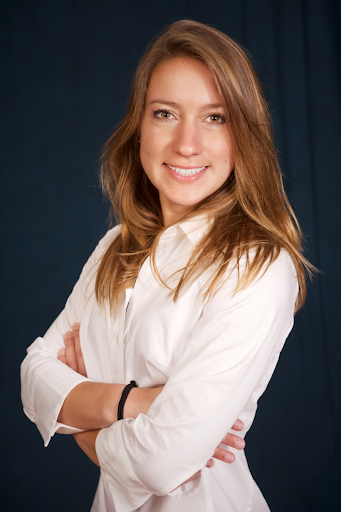Steering Committee Purpose
This Committee will lead UG2 by providing vision, support and guidance for advancing an active, widespread community of glider users that promotes ocean information, innovation, and integration.
Member Roles
- Be a committed advocate for UG2 goals and objectives.
- Understand the strategic implications and outcomes of UG2.
- Provide support to UG2 and ensure accountability of efforts.
- Provide guidance and acceptance of UG2 goals & objectives.
- Monitor and review projects.
- Attend quarterly UG2 meetings (one of which will be in person), and UG2 sponsored workshops.
Responsibilities
- Initiate an inclusive Underwater Glider User Group community with identified leadership and rotating positions.
- Provide guidance on communicating glider activities for example:
- Guiding web-based tools
- Establishing an online forum for technical information exchange
- Organizing a webinar series to advance U.S. glider community knowledge exchange (several potential topics were identified previously)
- Organizing technical sessions and town halls at conferences, workshops, and community events
- Soliciting and coordinating community input for shaping future User Group activities and collaborative tools
- Liaising with international players and leveraging the global efforts including OceanObs’19, UN Ocean Decade, and others.
For more information on membership governance, sponsors, and support of this committee, click here for the Committee Charter.
Current Members

Georgia Coward, UG2 Coordinator
Georgia graduated from the University of York, UK, in 2012 with her Masters in Marine Environmental Management. She also holds a Bachelor’s of Science from Bangor University, UK, in Marine Vertebrate Zoology. Her passion for the ocean began at an early age and since graduating has worked on a variety of ocean conservation projects throughout the Pacific and Indian Oceans. Her primary goal was to spend time working alongside the communities that were most dependent on marine ecosystems but were also experiencing the greatest impacts from anthropogenic threats.
Prior to joining COL/UCAR, Georgia most recently worked for the American Samoa Government’s Coral Reef Advisory Group as an Ecologist and Program Manager focusing on better understanding the health of the Territory’s coral reef ecosystems to guide management decisions. In addition to her passion for diving (2000+ dives as a PADI Rescue Diver) during her spare time she loves to travel and explore new places and cultures, bake, and hike.
Bill Lingsch, Outgoing UG2 Coordinator, NOAA
Bill Lingsch’s current position is to facilitate communication and collaboration across the US Glider Community for scientific collaboration and information/resource sharing for glider operators, data users, manufacturers, academia, and government agencies. He has over 39 years (31 with Navy and 8 in private industry) working in the oceanography and hydrography field that included doing oceans surveys globally and holding positions as Technical Lead, Program Manager (government and private sector), Department Head (over 100 civilians, military, and contractors producing operational oceanographic products), and as Assistant Chief of Staff (ACOS) for Commander, Naval Meteorology and Oceanography Command.


Carl Gouldman, Executive Liaison, U.S. Integrated Ocean Observing System, NOAA
Carl Gouldman has been Director of the U.S. Integrated Ocean Observing System (IOOS®) Office in NOAA, since February 2017. Prior to becoming the director, Carl served as the Deputy Director of the program since June 2014 and has been in NOAA since 2000. U.S. IOOS is a coordinated network of people and technology that work together to generate and disseminate continuous data on our coastal waters, Great Lakes, and oceans.
Kathleen Bailey, Oceanographer/Physical Scientist, U.S. Integrated Ocean Observing System, NOAA
Kathy Bailey is with the NOAA U.S. Integrated Ocean System Program Office, where she manages the Data Management and Cyberinfrastructure (DMAC) program. DMAC activities include management of a model output visualization and analysis tool (the IOOS Model Viewer), QARTOD project management, and oversight of data access and delivery of nonfederal observation data through federal systems and products. She joined the QARTOD BOA in 2015.
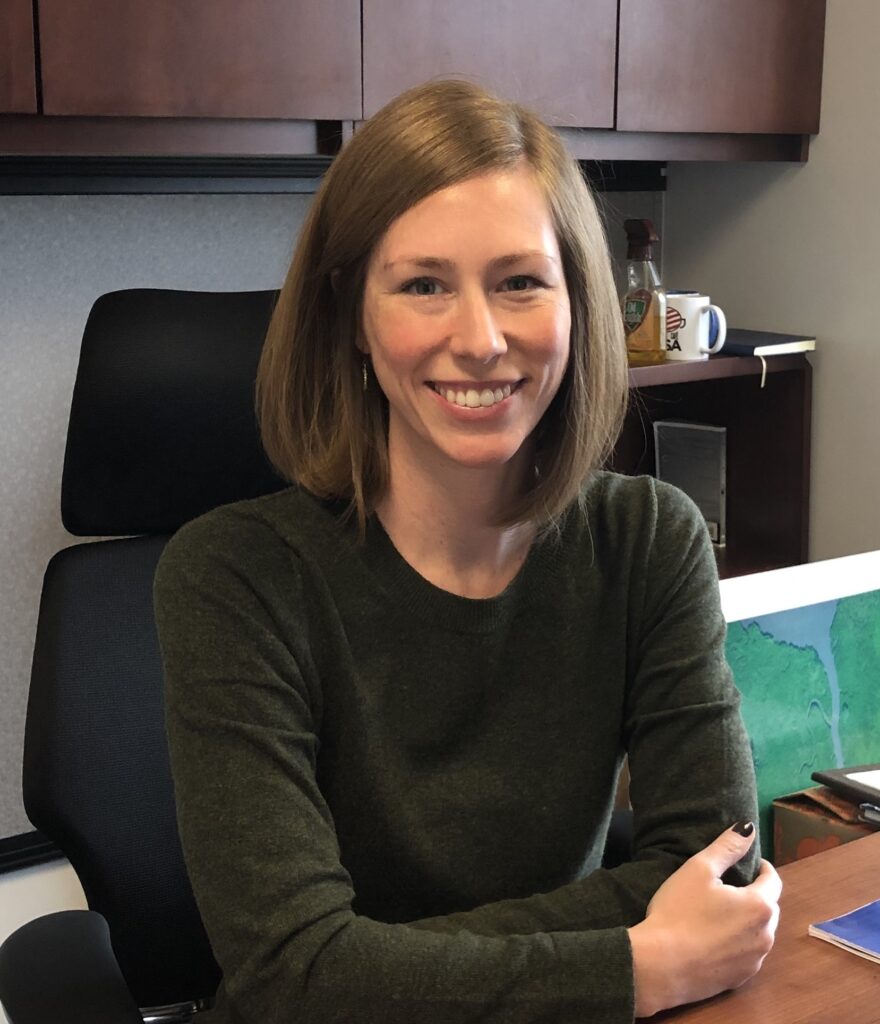
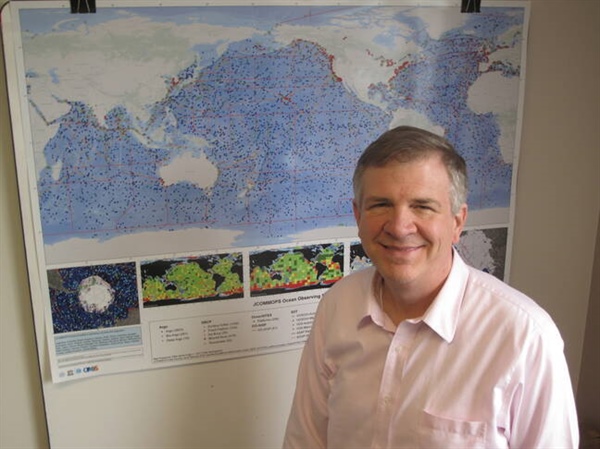
David Legler, Executive Liaison, Global Ocean Monitoring and Observing, NOAA/Oceanic and Atmospheric Research
Dave Legler currently serves as the Director, Global Ocean Monitoring and Observing program, currently within NOAA’s Oceanic and Atmospheric Research. GOMO is leading NOAA’s efforts to develop and sustain a global in-situ ocean observing system and related products for researchers, forecasters, and other consumers of ocean knowledge. He is currently co-chair of the GOOS Observation Coordination Group (formerly part of the WMO-IOC Joint Technical Commission for Oceanography and Marine Meteorology (JCOMM – http://www.jcomm.info/) and co-chairs the US Inter-agency Ocean Observation Committee (IOOC – http://www.iooc.us/).
Dr. Barbara Kirkpatrick, Gulf Coast Ocean Observing System (GCOOS)
Dr. Barbara Kirkpatrick is the former Executive Director for and now advisor to the Gulf of Mexico Coastal Ocean Observation System (GCOOS). She has more than 35 years of experience in human and environmental epidemiology and started her career as a Respiratory Care Supervisor at Duke University Medical Center before going on to receive a Master’s Degree in Health Occupations Education at North Carolina State University and a Doctorate in Educational Leadership from the University of Sarasota. In 1999, Kirkpatrick joined Mote Marine Laboratory as a staff scientist and shifted her research focus to environmental human health, particularly the respiratory effects linked to harmful algal blooms.

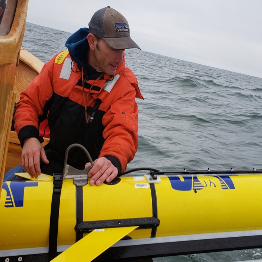
Hank Statscewich, University of Alaska Fairbanks College of Fisheries and Ocean Sciences
Hank Statscewich is a physical oceanographer and has been utilizing the Teledyne Slocum glider platform for over a decade in the Gulf of Alaska, the Chukchi Sea, the Arctic and Southern Oceans. He specializes in adapting new instrument technologies to the glider platform for use in the world’s high latitude marine environments.
Jennifer Patterson Sevadjian, Scripps Institute of Oceanography
Jenn Sevadjian is the data manager for the Spray glider program at Scripps Institution of Oceanography where she oversees data streams and data distribution. She has been part of the ocean observing community since 2002 and has held technical and data roles with NOAA, the Navy, the IOOS regional associations and MBARI. In addition to contributing to regional, national and international data management efforts, she designs and builds products, systems and interfaces to make it easier to find, access and use data. She enjoys providing training for users and data providers with the end goal of broadening and increasing usage of ocean observing data.
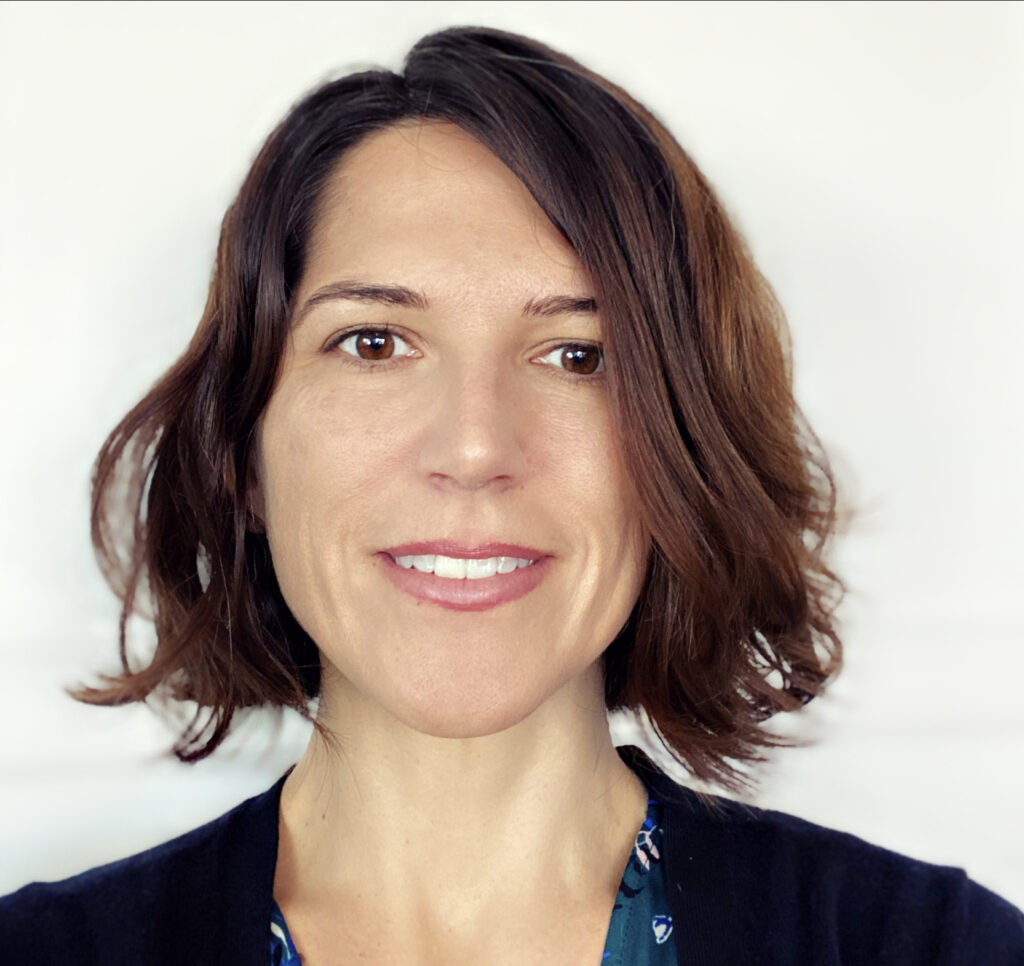
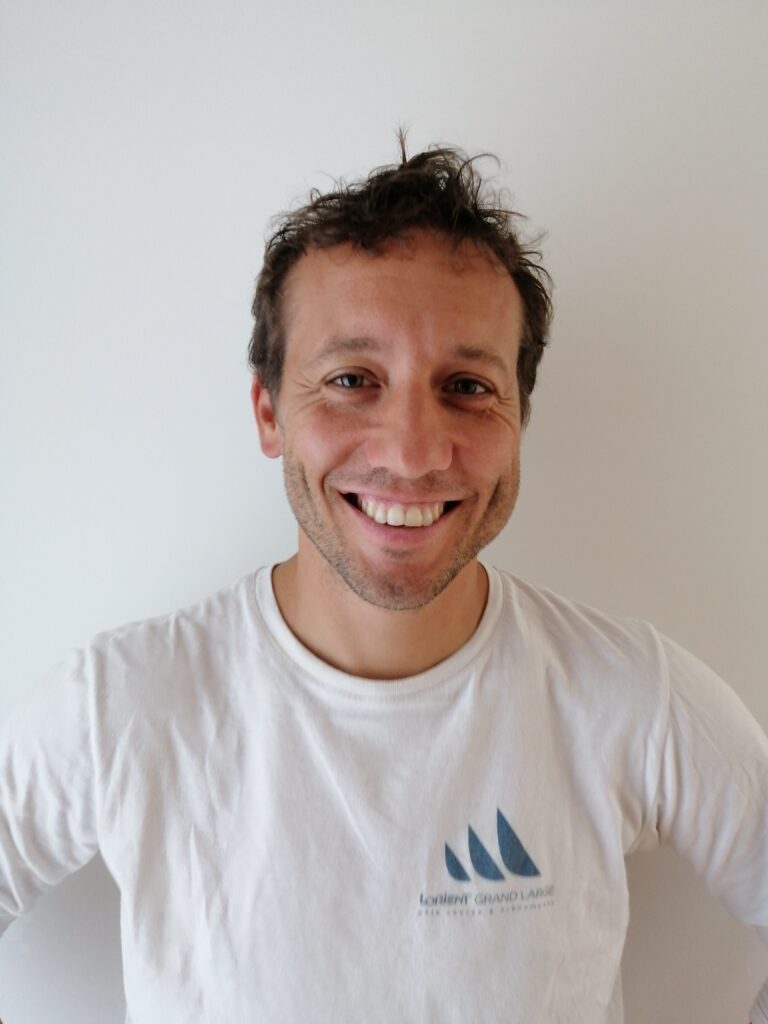
Victor Turpin – OceanGliders Technical Coordinator – JCOMMOPS
Victor Turpin is working for JCOMMOPS/IOC/UNESCO at the coordination of the international glider program of the GOOS – OceanGliders. He has been involved since 2014 in the European coordination of the glider activity in different international project (GROOM FP7, AtlantOS, ENVRI+). Victor’s work is about harmonization of the glider practices across the international glider community to strengthen and sustain the OceanGliders program and integrate as broadly as possible glider scientists, operators and manufacturers in the GOOS community.
Karen Dreger, Skidaway Institute of Oceanography at the University of Georgia
Karen Dreger has been working with Slocum gliders since 2009, operating them in the Gulf of Mexico and Atlantic Ocean. She has worked with every generation of Slocum glider, deploying, recovering, troubleshooting, repairing and installing new sensors. Karen currently is the lead glider technician at the Skidaway Institute of Oceanography at the University of Georgia. She also does consulting work. Karen received both her Bachelor’s and Master’s Degrees in Environmental Science & Policy from the University of South Florida – St. Petersburg.
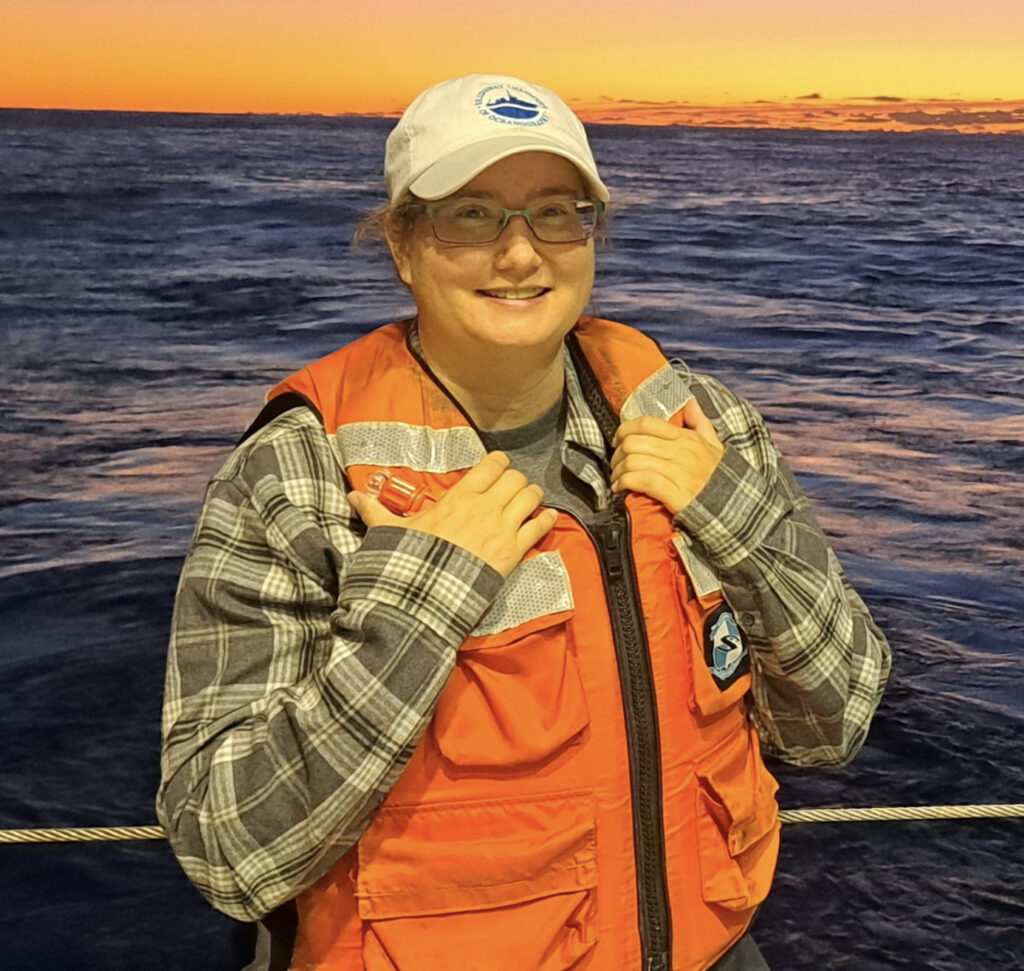

Doug Wilson, UVI Ocean Glider Laboratory
Doug Wilson is a Physical Oceanographer, Principal Investigator and Director of the UVI Ocean Glider Laboratory, and Courtesy Research Assistant Professor in the UVI College of Science and Mathematics. He has been conducting regional research in the Caribbean since 1991, using gliders since 2018. He was an Oceanographer with the US National Oceanographic and Atmospheric Administration from 1982-2012. His research interests include oceanography of the Caribbean Sea, western tropical Atlantic, and Gulf of Mexico; ocean circulation and heat transport; ocean data management and visualization systems; western boundary currents; equatorial ocean dynamics; Integrated Ocean Observing Systems; autonomous platforms, moorings, and instrument development. He was the founding co-chair of IOCARIBE-GOOS, the GOOS Regional Alliance for the Caribbean and Adjacent Regions, and is the lead for IOCARIBE on the UN Decade of Ocean Science Tropical Americas Observing and Forecasting System Project. In addition to serving on the UG2 Steering Committee, he is a member of GOOS OceanGliders STORMS Task Team.
Erica Fruh, NOAA Uncrewed Systems Operations Center
Erica Fruh is a Program Specialist with NOAA’s Uncrewed Systems Operations Center and we are supporting several glider projects. Erica has been with NOAA for 20+ years, conducting fisheries monitoring and habitat assessments. She was the project manager for the NWFSC’s AUV program, studying fish in untrawlable habitats and deep sea corals and sponges. As a part of the UXSOC, Erica is new to the glider world, but is learning rapidly about NOAA’s existing glider operations, and finding ways for us to contribute.

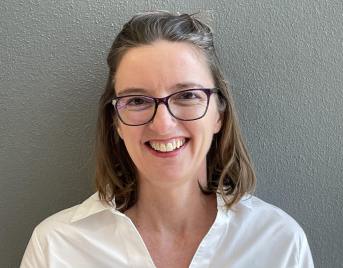
Jennifer Bowers, NOAA
Jennifer Bowers joined NOAA in April, 2021 to coordinate the NCEI Uncrewed Systems Data Enterprise. She leads a team that is partnering with the Navy to develop NOAA/Navy data exchange standards under the CENOTE Act of 2018. Other team activities include researching the use of innovative technologies to build a framework for the UxS Data Enterprise by developing specific UxS data use cases. Jennifer comes to NOAA with over 20 years of experience providing Naval oceanography support across the spectrum from tactical mission support to long term strategic planning. As an early career bio-optics specialist, she was uniquely positioned to work her way from research with developmental in situ bioluminescence sensors to synoptic ocean color remote sensing. She developed strategic thinking skills working as a Requirements Analyst for the Plans and Program Office of the Commander Naval Oceanography and Meteorology Command staff. Currently serving as NCEI’s lead UxS Data Coordinator, she believes that NOAA can provide high impact products with global reach, by combining data from individual UxS deployments with larger global data sets in innovative ways to increase their value in large scale environmental monitoring activities.
Jorge Brenner, GCOOS
Dr. Jorge Brenner is the Executive Director for the Gulf of Mexico Coastal Ocean Observing System (GCOOS). He has more than 15 years of experience in marine ecology, biodiversity conservation, environmental engineering, geospatial data science, ecological economics, ecological restoration, fisheries sustainability, and climate change risk management.
He obtained his doctorate in Marine Science from the Catalonia Polytechnic University in Barcelona, Spain. His dissertation was focused on mapping and valuing ecosystem services in the Mediterranean coast in a collaboration with the Spanish National Research Council (CSIC) and the Gund Institute for Ecological Economics of the University of Vermont. After completing his doctoral degree, he joined the Harte Research Institute for Gulf of Mexico Studies at Texas A&M University – Corpus Christi as a Post-Doctoral Researcher. During the last 10 years, he has served as an Associate Director of Marine Science and Sustainable Fisheries with The Nature Conservancy. He also holds a bachelor’s in science in Marine Biochemical Engineering, and a master’s in Environmental Engineering from the Monterrey Tec Institute.
Throughout his career, Dr. Brenner has led projects and published about biodiversity informatics, strategic conservation planning, migratory transboundary resources, international marine protection initiatives, natural capital sustainability, and risks and adaptation to climate change in social-ecological systems. He has managed environmental projects and research in support of collaborations in the US, Mexico, Cuba and Spain and, since early in his career, has mentored national and international students.
He was a member of the National Research Council’s Committee of the Effects of the Deepwater Horizon Mississippi Canyon-252 Oil Spill on Ecosystem Services in the Gulf of Mexico and co-authored two books published by the National Academies.
Dr. Brenner grew up in Veracruz, Mexico along the Gulf of Mexico coast, where he learned to SCUBA dive. Today he is an American Academy of Underwater Sciences-certified scientific diver.
As the new Executive Director of GCOOS, Dr. Jorge Brenner is interested in continuing the successful work under his predecessor, Dr. Barbara Kirkpatrick, and exploring additional opportunities in ecological forecasting, climate risks, and collaborations around the Gulf of Mexico.

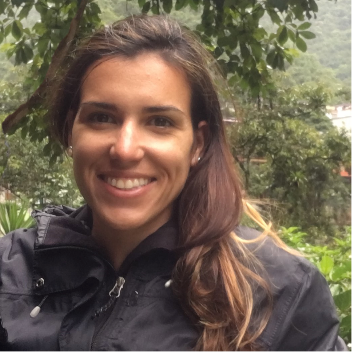
Patricia Chardón-Maldonado, Caribbean Coastal Ocean Observing System (CARICOOS)
Dr. Patricia Chardón-Maldonado currently serves as technical director of the Caribbean Coastal Ocean Observing System (CARICOOS). CARICOOS is one of the 11 regional partners in the U.S. Integrated Ocean Observing System (IOOS). CARICOOS mission is to provide decision supporting information for enhancing safety in our coasts and ocean, improving efficiency of maritime operations and support coastal resource management in Puerto Rico and the U.S. Virgin Islands. Dr. Chardón-Maldonado obtained a B.S. in Civil Engineering and M.S. in Environmental and Water Resources Engineering both from the University of Puerto Rico at Mayaguez (UPRM), and a Ph.D. in Coastal Engineering from the University of Delaware. As technical director, she supervises all technical aspects of the project, including the CARICOOS numerical modeling and observational efforts. Her primary research/professional interests combine field and numerical model research to enhance our understanding of nearshore and coastal hydrodynamics and morphodynamics, wave-body interaction, nearshore-water-land system, and coastal protection systems (natural and hybrid). All of this with the goal of promoting a consistent, well-integrated, and sustainable approach to the management of coastal hazards in Puerto Rico, as well as maintain a healthy, resilient, and sustainable ocean and coastal resources for the benefit of present and future generations.
Joe Gradone, Rutgers University
Joe Gradone is a Ph.D. Candidate in Oceanography in the Department of Marine and Coastal Science at Rutgers University. His research focuses on the circulation dynamics of the tropical Atlantic and the transport of climatically important water masses. Joe is also interested in developing new sensors, processing techniques, and glider flight behaviors. His education includes a B.S. in Geology from the University of Colorado and a M.S. in Oceanography from the University of Delaware. Following his M.S. and prior to coming to Rutgers for his Ph.D., Joe worked as a Slocum Glider Customer Support Applications Engineer at Teledyne Webb Research. While working for Teledyne, he was heavily involved with vehicle R&D, customer trainings, and piloting.

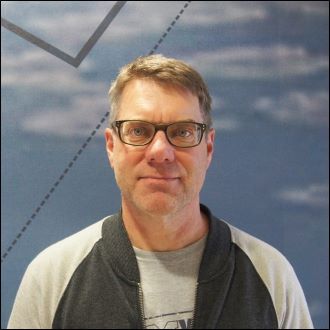
Russ Miller, University of michigan
Russ Miller is an Observing System Engineer and the Observing Systems Theme Lead for the Cooperative Institute for Great Lakes Research (CIGLR) at the University of Michigan. Since 2011, he has been responsible for Uncrewed Underwater Systems and Environmental Buoy operations and development for CIGLR. His projects include environmental buoy and autonomous glider operations for the Great Lakes Observing System (GLOS), and development and operations of the Western Lake Erie Nutrient Buoy network for the SOAR project. Russ is interested in increasing the density of observations in the Great Lakes by reducing the cost and infrastructure needed to deploy and maintain sensors in the field and increasing their reliability.
Kevin Martin, University of Southern Mississippi (USM)
Kevin Martin is the Senior Marine Instrumentation Specialist – Ocean Observing Manager for the School of Ocean Science and Engineering – Marine Science at the University of Southern Mississippi (USM). He has been working with glider since 2007 and is familiar with both the Slocum and Seaglider platforms. Kevin is currently an instructor in the Unmanned Maritime Systems course being taught at the USM. Kevin is currently heavily involved with Gulf of Mexico Ocean Observing Systems, working with glider, buoys and HF radar systems. Before working for USM, Kevin received his BS/BA in Marine Biology/Environmental Chemistry for Roger Williams University, in Britsol, RI and a MS in Marine Science from the USM.


Yui Takeshita, Monterey Bay Aquarium Research INstitute
Yui Takeshita is a scientist at the Monterey Bay Aquarium Research Institute. His group focuses on establishing the global Biogeochemical Argo array, and adapting those biogeochemical sensors for underwater glider applications. Currently, his group is working on integrating pH and nitrate measurements onto glider operations in the California Current System.
Katherine D. Zaba, MRV Systems
Katherine is the Director of Glider Programs at MRV Systems, LLC, where she is managing the commercialization of the Spray2 next-generation underwater glider. During her prior roles as a postdoctoral scholar and graduate student at the UC San Diego Scripps Institution of Oceanography, she worked with Spray gliders to conduct research on oceanic boundary currents, El Niño-Southern Oscillation, marine heatwaves, and physical-biological interactions. Katherine received her Ph.D. in Oceanography from the UC San Diego Scripps Institution of Oceanography in 2018, and her B.S. degrees in Applied Mathematics and Atmospheric, Oceanic, Environmental Sciences from UC Los Angeles in 2010.
